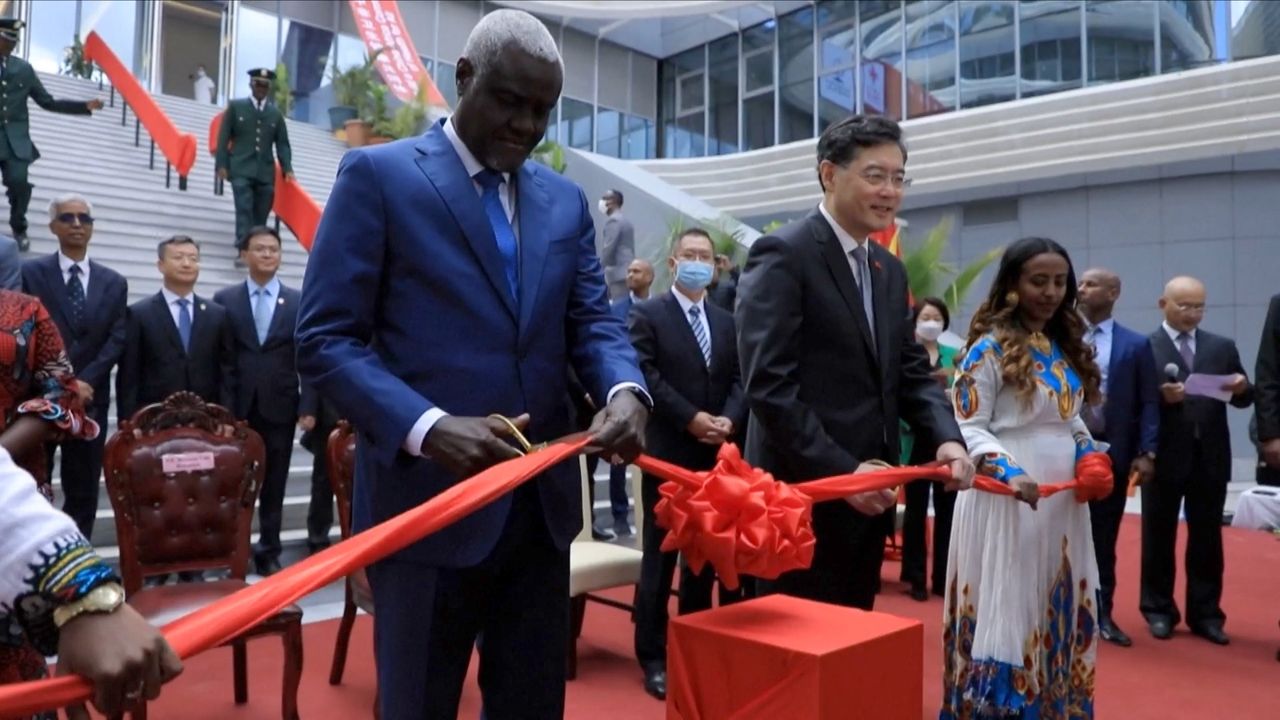China's strategic muscle-flexing is not limited to its expansive maritime claims and vigorous infrastructure exports; Chinese entities has also been...
Vous n'êtes pas connecté
- English
- Français
- عربي
- Español
- Deutsch
- Português
- русский язык
- Català
- Italiano
- Nederlands, Vlaams
- Norsk
- فارسی
- বাংলা
- اردو
- Azərbaycan dili
- Bahasa Indonesia
- Հայերեն
- Ελληνικά
- Bosanski jezik
- українська мова
- Íslenska
- Türkmen, Түркмен
- Türkçe
- Shqip
- Eesti keel
- magyar
- Қазақ тілі
- Kalaallisut ; kalaallit oqaasii
- Lietuvių kalba
- Latviešu valoda
- македонски јазик
- Монгол
- Bahasa Melayu ; بهاس ملايو
- ဗမာစာ
- Slovenščina
- тоҷикӣ ; toğikī ; تاجیکی
- ไทย
- O'zbek ; Ўзбек ; أۇزبېك
- Tiếng Việt
- ភាសាខ្មែរ
- རྫོང་ཁ
- Soomaaliga ; af Soomaali
Rubriques :
 Maroc - EURASIAREVIEW.COM - A la une - 13/Sep 15:52
Maroc - EURASIAREVIEW.COM - A la une - 13/Sep 15:52
Chinese Agriculture In Global Lands – OpEd
China's strategic muscle-flexing is not limited to its expansive maritime claims and vigorous infrastructure exports; Chinese entities has also been aggressively acquiring lands overseas. In recent years, China's overseas agricultural investment has maintained rapid growth and is “State-Driven: Going Global Strategy," which provides support to promote agricultural globalization. Chinese companies are buying up land wherever it interests China. The combined area of land purchased or leased by such companies over the past decade is believed to be equal to the total land area of Sri Lanka. “Going global” gained more impetus after President Xi Jinping’s: Revised food security strategy issued in late 2012 and the One Belt One Road Initiative (BRI) launched in 2013. The revised national food security strategy advocated a proactive approach of boosting domestic production through technology and greater efficiency, while encouraging Chinese companies to gain control over the supply chain for imports of agricultural commodities. The new strategy aimed for self-sufficiency to rice and wheat and allowed for “Moderate” imports of other commodities. China’s “New Silk Road Economic Belt” and “Maritime Silk Road” initiative part of the so-called BRI is now a major driver of “Going Global” in agriculture and in every sphere. Infrastructure construction and other types of investment are aimed at creating trade routes from China to Western Europe and creating new markets for Chinese goods. BRI is President Xi’s flagship project to install the Chinese mark globally through initiatives focusing on building ports, railroads, roads, ports and logistics facilities. Chinese companies are increasing their investments in foreign agricultural and food assets. Their broad aims are to gain profits for Chinese investors while achieving national food security and projecting China’s influence abroad. China’s outward agricultural investment in farming activities is one of the largest in Russia. Countries Owning Most Lands in US In 2011, two Chinese entrepreneurs bought a 22,000-acre ranch in Utah to grow alfalfa for export to China. In 2015, Yili Group, a Chinese company, and Dairy Farmers of America built a milk powder processing plant in Kansas.US is the largest supplier of agricultural goods to China. In 2023, at least 81 bills banning Chinese ownership of US land were introduced across 33 states restrict Chinese-owned businesses. Maine and Texas – which are the top two states for most foreign-held lands – have no laws restricting foreign ownership of land. A Cornell-led study found that China doesn't own a large amount of farmland in the US. China surprisingly holds less than 1% of all foreign holdings in the US whereas there was a lot of hue and cry of the Chinese land holdings. The lawmakers have been concerned about Chinese landownership because of the fear that China could likely use the land to set up espionage operations or that US food security could be threatened if too much farmland is bought up. According to a USDA Farm Service Agency report at the end of 2021, foreign land holdings in the US was about 40 million acres of farm and forest land. That’s about 3.1% of the country’s privately held farm and forest land. Of all foreign-owned US land, Canadian investors owned the most with 12.8 million acres. This makes up 31% of all foreign-owned US land most of the forest land controlled by Canadian owners for timber. Four other countries held 12.4 million acres combined, or another 31% of foreign-owned land: the Netherlands (12%), Italy (7%), the United Kingdom (6%), and Germany (6%). The remaining 15.6 million acres are split up among around 100 other countries, including India, Saudi Arabia, and Iran. Foreign entities have bought this land for food production, energy projects such as wind or solar farms, or as an investment due to its stable growth and returns. Latin America Chinese agricultural firms are investing in the food supply chain in Latin America, though their focus is more on trade than investment. China imports a lot of soy, fruits, and luxury food items from Latin America. Chinese Major Investments New Zealand Chinese have Major Investments in the New Zealand dairy sector. To name a few from some old data: Shanghai Pengxin Crafar Farms (7,892 hectares) Land and facilities $70 million 16,000 cattle. Shanghai Pengxin Lochinver Farms (13,800 hectares) Land and facilities $70 million 5,800 cattle/60,000 sheep. Shanghai Pengxin Synlait Farms Land and facilities $20 million 13,000 cattle. Bright Dairy 51% share of Synlait Milk Firm acquisition $58 million. UHT milk Yili Industrial Group 100% of Oceania Dairy Group. Chinese Agricultural ‘Land Grab’ in Africa Over the last few years, there has been considerable media attention and public debate on the phenomenon that has come to be known as ‘Land Grab’. Many scholars and activists have talked about a great surge in foreign investments to acquire land in less-developed countries, particularly in Africa. Describing what they called the “scramble” for Africa’s land resources. Chinese agricultural investment in Africa involves land purchases. There is a consensus in Africa that agriculture is one of the keys to achieving sustainable and inclusive growth. Most of Africa’s population and its poor depend on agriculture, so this sector can provide potentially significant gains. Agriculture also has the potential to become one of the growth engines of the continent, help Africa’s industrialization through agro-processing and agro-business, and reduce the dependence on the services sector, which is currently the main driver of growth. In light of this opportunity, China with an already rapidly growing economic interest in the continent has been accused of an abundance of “Land Grabs” in Africa. The total area of land that China owns in Africa is approximately 186,000 square miles (465,000 square kilometers). This is around 7% of the total land area in Africa! Contrary to reports that Chinese firms were buying or leasing millions of hectares of prime African farmland. Chinese investors have acquired only about 240,000 hectares, according to a book "Will Africa Feed China?" recently published by Deborah Brautigam, director of the China Africa Research Initiative at Johns Hopkins University. On the other hand, China is alleged to be one of the biggest sources of investment for acquiring land in Africa. As per the Land Matrix database. Such accounts reflect the widespread notion that China is trying to acquire vast tracts of land in Africa and that this may be akin to colonizing areas in Africa through their “State-Driven: Agriculture Going Global Strategy." Appears China under President Xi Jinping is teaching the world how to do business cleverly. China’s craving for others’ land has no limits. Since the last few decades, China has instated its aggressive land grab strategy in many parts of the world. Colonial powers such as France and Britain grabbed almost the whole African mainland. Experts claim that in the 21st century, the People’s Republic of China (PRC) has turned into a neocolonial power having a close similarity to the European colonial powers in African and Middle Eastern nations that existed in the 19th and 20th century. According to Ex Maldivian President Mohamed Nasheed, “China in the last few years without shooting a single bullet has grabbed more land than the British Empire’s “East India Company”.
Articles similaires
China Pledges $51 Billion to Africa, Vows to Create One Million Jobs
In a significant announcement that could reshape economic dynamics on the African continent, China has pledged a staggering $51 billion in financial...
China Pledges $51 Billion to Africa, Vows to Create One Million Jobs
In a significant announcement that could reshape economic dynamics on the African continent, China has pledged a staggering $51 billion in financial...
Africa Needs Strategic and Disciplined Approach in Relations with China
China has been forging closer ties with Africa, a relationship that some see as burdened with debt, while others praise it as increasing Africa's...
Africa Needs Strategic and Disciplined Approach in Relations with China
China has been forging closer ties with Africa, a relationship that some see as burdened with debt, while others praise it as increasing Africa's...
As China Buys Less Oil, Angola Struggles To Repay Debt
Angola’s long-running financial relationship with China has been built on a simple equation: Angola would repay its growing Chinese debt with oil,...
As China Buys Less Oil, Angola Struggles To Repay Debt
Angola’s long-running financial relationship with China has been built on a simple equation: Angola would repay its growing Chinese debt with oil,...
China’s Structural Outflow Of Foreign Investment Remains A Serious Challenge – Analysis
By Yang Xite In the process of stabilizing the economy in China this year, two major microeconomic groups have attracted significant attention,...
How Geopolitics Influencing China’s African Policy – OpEd
The Forum on China-Africa Cooperation, held in Beijing, was the grandest summit in China during the past few years, with 53 African Heads of State...
Maldives Debt Crisis: China Secures Finance Pact
Beijing: China and the Maldives have signed a new financial agreement today, enabling Beijing to offer increased financial aid to the debt-ridden...
Les derniers communiqués
-
Adobe Brings Conversational AI to Trillions of PDFs with the New AI Assistant in Reader and Acrobat
Adobe - 21/02/2024
-
Laura Frigenti takes the Helm as Chief Executive Officer of the Global Partnership for Education
Global Partnership for Education - 05/12/2022

